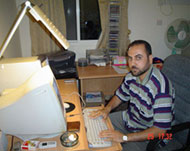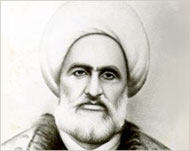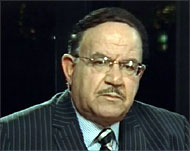Everyone is a target in Iraq
Nowadays in post-invasion Iraq, everybody is on somebody’s hit-list. Different political groups have emerged with contradictory interests and views, and some are resorting to violence against rivals.

Iraqi political analyst Liqa Makki said the hit-list phenomenon has in the past afflicted many countries, but Iraq‘s case is much too complex.
“The most confusing thing about them is the diversity of targets. It is painful to say it, but we have to acknowledge that those who carry out those assassinations have managed to make every Iraqi think that he or she is a potential target somehow,” he said.
Iraqi Shia Muslims have coalesced around three blocs. The group which follows the Iranian Shia cleric Ayat Allah Ali al-Sistani sees the US-led invasion as a liberation which snatched the country from the jaws of a “tyrant ruler” who “spread fear and havoc”.
The young cleric Muqtada al-Sadr, who derives his authority from his family’s religious history, opposes the political process but has no problem participating in it to “stay close to the country’s issues”. His followers are in constant revolt against both Iraqi and non-Iraqi authorities.
 |
|
Raghib says he fled Iraq because |
Those who follow Baghdad’s highest Shia authority, represented by the family of the Grand Al-Khalisi (Shaikh Muhammad Mahdi al-Khalisi, a key participant in the 1920 revolution against the British in Iraq), are totally opposed to the political process and their position is nearly identical to that of Iraqi Sunni Muslims.
Aljazeera.net spoke to several Iraqis investigating the hit-lists.
Kahlil Mashaan, 70, a resident of Baghdad, said he lost his next-door neighbours because of militia terror.
The conflicting interests and absence of order have allowed militias to take the law in their own hands, by forcing their ideologies on people and assassinating individuals who do not agree with them.
“Some months ago we suddenly heard people screaming and women weeping. My wife and I ran to the street to see a dead man on the floor with blood stains all around.
“We found out he was the son-in-law of our neighbour, Samiya al-Aaraji. It turned out later that the assassins were after her son, who was said to be a member of Badr Brigades [the military wing of the Supreme Council for Islamic Revolution in Iraq – SCIRI],” Kahlil said.
“After that, they felt afraid and left us to settle in Najaf. So because of the chaos created by the state of lawlessness, our neighbourhood lost a good family who had lived among us for more than a decade, and used to interact with us closely although they were Shia and our district is mostly Sunni,” he said.
Iraq‘s resistance factions are believed to be behind the assassinations of some members of Shia political parties, accusing them of aiding foreign forces in Iraq.
One faction, the Unified Command of the Mujahideen – Political Committee, recently published a statement on the internet accusing Shia militias and leaders of backing the US-led forces.
The statement, whose authenticity could not be verified by Aljazeera.net, urged Iraqi fighters to kill any Iraqi who backs the “occupiers”.
Kurds
The Kurdish- and Shia-led government, backed by occupying US forces, is facing a revolt mainly by Sunni Arabs aimed at bringing it down.
![Makki: Everyone [in Iraq nowadays] is a potential target](/wp-content/uploads/2005/10/8384518f501acaa0348fb89f21d88e4150a76.jpeg) |
|
Makki: Everyone [in Iraq |
Kurds are seen by some Iraqis as the main instigators of several unacceptable constitutional articles, namely federalism based on ethnicity, which they see as a potential trigger for Iraq’s break-up.
Kurdish parliamentary deputy Faris Hussein was shot dead along with three bodyguards on Saturday night as he travelled to Baghdad from the north. The killing took place near the Shia town of al-Dujail.
Fellow deputy Haider Qassem was wounded, National Assembly spokesman Peshro Saeed said.
Sunni
On 12 September, two Sunni clerics were assassinated in Baquba, 60km north of Baghdad.
“Shaikh Hashem al-Kashali was killed on the spot when armed men opened fire on his car,” said Muthanna Ibrahim, who was wounded along with another person.
“Shaikh Mahmoud Ghazzawi, who was wounded, died at the hospital of Baquba where he was admitted,” Ibrahim said.
Usually no party claims responsibility for the assassination of Sunni Muslim clerics and activists, but the general perception among Iraqis is that the militias of Shia ruling parties are doing the job.
Shia parties have, however, strenuously denied the accusation.
Umar Raghib, a member of Iraq‘s Association of Muslim Scholars who fled Iraq to Jordan in July, said he was arrested by Iraqi police and then fled the country when he learned that his name was on a hit-list.
“They have been targeting us [Sunni scholars] – all my colleagues have been either detained for an indefinite period or assassinated,” he told Aljazeera.net.
“They tortured me savagely; they used to hang me upside down and whip me. The problem is they were never clear about what exactly they wanted from me,” he said.
 |
|
Al-Khalisi, a key participant in |
“When I was released after intervention by the association, my sources told me that I was on a hit-list, so I left my country.”
Several human-rights groups have denounced what they said was torture at the hands of Iraqi police.
The Ministry of Human Rights in July launched an investigation into alleged torture by police. The report is supposed to be submitted to the ministries of interior and justice, but no information has been available about its progress.
Turkmen
The oil-rich Iraqi city of Kirkuk has been the subject of deep disagreement between the Kurds and other Iraqis.
Kurds insist the city should join their intended self-rule region in northern Iraq, but other Iraqis, especially the Turkmen, say the city has never been Kurdish and Turkmen there have lived in harmony with other ethnic groups.
On 14 September, unknown assailants killed the Turkmen leader Qassab Uglu in Kirkuk. The official in the Turkmen Front was a victim of a drive-by shooting, according to witnesses at the scene.
Turkmen officials were not available to comment on Uglu’s assassination, but Najati Kalatchi, the secretary-general of the Committee for Defending Turkmen Rights, said suspicion had fallen on the Kurds.
“Who else other than Kurds would target the Turkmen? We have lived in harmony even with the Arabs brought to the city by Saddam Hussein’s government.”
 |
|
Haroun Muhammad suggests the |
Kalatchi said: “Actually, the people of Kirkuk, including Kurds, did not have a problem with each other. The problem is with those Kurds who were brought to Kirkuk after the occupation from all over Iraq and the neighbouring countries, in order to increase the number of Kurds and become a majority in the city.”
“They are brainwashed that Turkmen and Arabs are the Kurds’ enemy.”
Former soldiers
Members of the former Iraqi army and air force who fought in the eight-year Iran-Iraq war have been targeted all over Iraq.
London-based Iraqi political analyst Haroun Muhammad suggests that the Badr Brigades, which was founded and is supported by Iran, is waging a revenge campaign.
“Until the 1st of last June, seven Iraqi pilots who took part in the war with Iran had been assassinated, among them Air Force Major-General Abd al-Rahman Muhammad Ali and Air Force Major-General Bahaa al-Din Muhei al-Din, who were assassinated in the Baladiyat district east of Baghdad city.
“There are 160 other pilots on the hit-list of the Badr Brigades,” Muhammad told Aljazeera.net.
Another hit-list has been compiled by militias loyal to countries bordering Iraq, Muhammad said, and targets 360 officers of the former Iraqi army who were decorated with more than five Bravery Medals (given by Saddam Hussein to distinguished soldiers) during the war with Iran.
“This list consists of officers and non-commissioned officers from all over Iraq. This list has been leaked somehow, and as a result of that, those [officers] who live in the south in Shia-dominated areas have fled their homes and settled in specific districts in Baghdad, which are regarded relatively safe,” Muhammad said.
Officials
Politically, the ousted Baath Party is in armed confrontation with the new rulers of Iraq. The once-fierce opponents of the Baath Party, the Shia Dawa Party and the SCIRI, are ruling the country now, and the Baath Party is fighting back.
|
“Actually, the people of Kirkuk, including Kurds, did not have a problem with each other. The problem is with those Kurds who were brought to Kirkuk after the occupation from all over Iraq and the neighbouring countries, in order to increase the number of Kurds and become a majority in the city” Najati Kalatchi |
On 10 September, Adnan Abd al-Hamza, a major-general in the Ministry of Interior, was assassinated in al-Ghazaliya district west of Baghdad.
On the same day, Awad Eissa, a general manager in the Ministry of Agriculture, was shot dead as he was travelling in his car in Abu Ghraib, west of Baghdad.
Many factions deem Iraqi officials as traitors and collaborators who work in a “puppet government” formed by a foreign invading force.
Officials have been receiving threats to quit their jobs or be killed.
Scholars
The assassinations of Iraqi scientists started shortly after the US-led invasion of Iraq, Muhammed said. In the beginning it was thought that the target was scientists who worked in Iraq‘s former programme of weapons of mass destruction.
But the assassinations have taken the lives of many experts in fields that have nothing to do with weapons and military sciences, such as Arabic and history.
“Iranian-backed militias hold teachers of Arabic and history as allies with Saddam’s government, neglecting the fact that they were doing their jobs within a sovereign country, which had its own point of view in its history.”
“As for scientists, it is clear that several foreign forces are interested in evicting Iraq of its qualified people,” Muhammad said.
The Ministry of Higher Education has announced that 146 university professors were assassinated in the past two years.